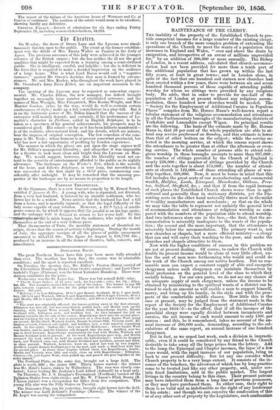60t tatrts.
On Monday, the doors of Drury Lane and the Lyceum were simul- taneously thrown open to the public. The event at the former establish- ment was the debat of Mrs. Emma Waller as Pauline in the Lady of Lyons. The previous successes of this lady were achieved in the younger colonies of the British empire ; but she has neither the ill nor the good qualities that might be expected from a training among a semi-civilized public. She is intelligent, careful, and ladylike ; but she is deficient in the force that is required to make a decided impression on the audience of a large house. This is what Lord Bacon would call a "negative instance," against Mr. Owen's doctrine that man is formed by circum- stances. Mr. and Mrs. Keeley, who throughout the week have played in Mr. Oxenford's farce Twice Killed, are en important accession to the company. The opening of the Lyceum may be regarded as somewhat experi- mental. Mr. Charles Dillon, the new manager, has indeed brought together an unusually large number of established actresses ; and the names of Miss Woolgar, Miss Fitzpatrick, Miss Rosins Wright, and Miss Harriet Gordon, (who, by the way, would do well to restrain certain exuberances of style,) make up a fair constellation in a play-bill. But it is on the histrionic power of Mr. Dillon himself that the success of the enterprise will mainly depend ; and certainly, if his performance of Le- maitre's character in .Paillasse, called in English Belphegor, is to be taken as a specimen of his general achievements, his prospects may be considered good. His school—as far as it has been hitherto manifested— is of the realistic, ultra-natural kind ; and his details, which are minute, bear the impress of original conception. The low comedian of the com- pany is Mr. Toole ; whose humour is at present somewhat provincial, but who has now a fair opportunity of profiting by London experience. The manner in which the pieces are put upon the stage argues well for Mr. Dillon's managerial liberality ; and altogether it was impossible for a theatre to look more clean and bright than the Lyceum on Mon- day. We would suggest, however, that his liberality need not ex- tend to the Quantity of entertainment afforded to the public as its nightly allowance. The burlesque on the Winter's Tale, which is the novelty of the hour, and follows Belphegor, is very long, but nevertheless it was succeeded on the first night by a third piece, commencing con- siderably after midnight. It may be remarked that the amusing pro- perties of the burlesque are by no means in proportion to its length.


























 Previous page
Previous page